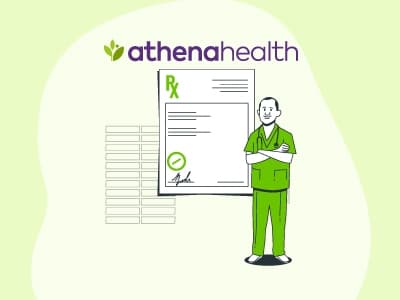Medical billing errors are a major cause of delayed payments, increased operational costs, and potential revenue loss. According to a report by Premier, hospitals and health systems are spending an estimated $19.7 billion each year to address denied claims. For practices using athenahealth billing software, training staff to effectively use the system can help address these issues.
In this guide, we will outline effective strategies and tips to train your staff on athena billing software for optimal use and improved revenue cycle efficiency.
Practices considering implementing this billing platform should conduct knowledge assessments to determine which staff members require in-depth training. It is important to assess the skill levels of billing and clinical staff to identify knowledge gaps and ensure that everyone is proficient in using the software’s key features.
For example, staff who handle claims should be familiar with athenahealth’s ‘Billing Rules Engine’ to identify potential denials before they occur, as well as coding systems like CPT, ICD-10-CM, and HCPCS Level II. Additionally, front-office staff should know how to navigate the workflow dashboard to maintain accurate revenue streams.
After assessing staff skill levels, practices should create a training plan tailored to the unique needs of their billing team. Customized training modules for specific staff roles, such as billing specialists, front office personnel, and coders, can help make the training more relevant and engaging. This targeted approach not only improves software competency but also reduces the administrative burden associated with incorrect claims and billing errors.
A recent KLAS report also shows that clinicians who receive workflow-specific training are less likely to report burnout. This emphasizes the importance of customizing training and coaching efforts to address individual software usage needs, which can help minimize staff burnout and ensure athenahealth’s billing software integrates seamlessly into daily workflows
To maximize the effectiveness of athena billing software training, practices should offer hands-on training exercises through role-playing key billing tasks. Simulate real-world scenarios such as entering patient details during check-in, verifying insurance information, filing claims and collections, and resolving denied claims. This can help staff gain practical experience and learn how to troubleshoot issues before they experience them in their day-to-day operations.
Another helpful strategy for training staff on athena software is to recruit a team of superusers within your practice, key individuals who become the go-to experts for any billing-related questions. These superusers can be highly knowledgeable billing specialists who are proficient in navigating this billing system. Their best practices should be documented and shared with all software users.
Practices should also provide a variety of training resources and e-learning modules that cover key billing workflows, such as:
In addition to e-learning, practices should also use other resources like video tutorials provided by the vendor. For example, athenahealth offers detailed demos on essential billing features like the workflow dashboard, check-in and check-out processes, reporting, and authorization management. These resources help staff learn at their own pace and ensure they are well-equipped to handle billing tasks effectively.
As medical billing processes, industry regulations, and payer requirements are constantly evolving, ongoing training is essential to keep your team up to date. This ensures that staff can easily adapt to changes, such as the annual CPT code updates from the American Medical Association (AMA) and the ICD code revisions from the Centers for Medicare & Medicaid Services (CMS).
Here's how you can ensure continuous improvement in your workflows with athenahealth:
Declining financial performance is a serious threat to the sustainability of many healthcare organizations. According to a recent athenahealth physician sentiment survey, only 38% of physicians believe their organization is on solid financial footing, highlighting the need for effective financial management strategies.
athenahealth's end-to-end revenue cycle management solution is designed to eliminate inefficiencies and streamline day-to-day billing processes, from appointment scheduling to accounts receivable (A/R) follow-up. However, without proper training, practices may struggle to maximize the potential of this system. The strategies outlined above can help empower staff to effectively use the software and enable practices to achieve their operational and financial goals.
